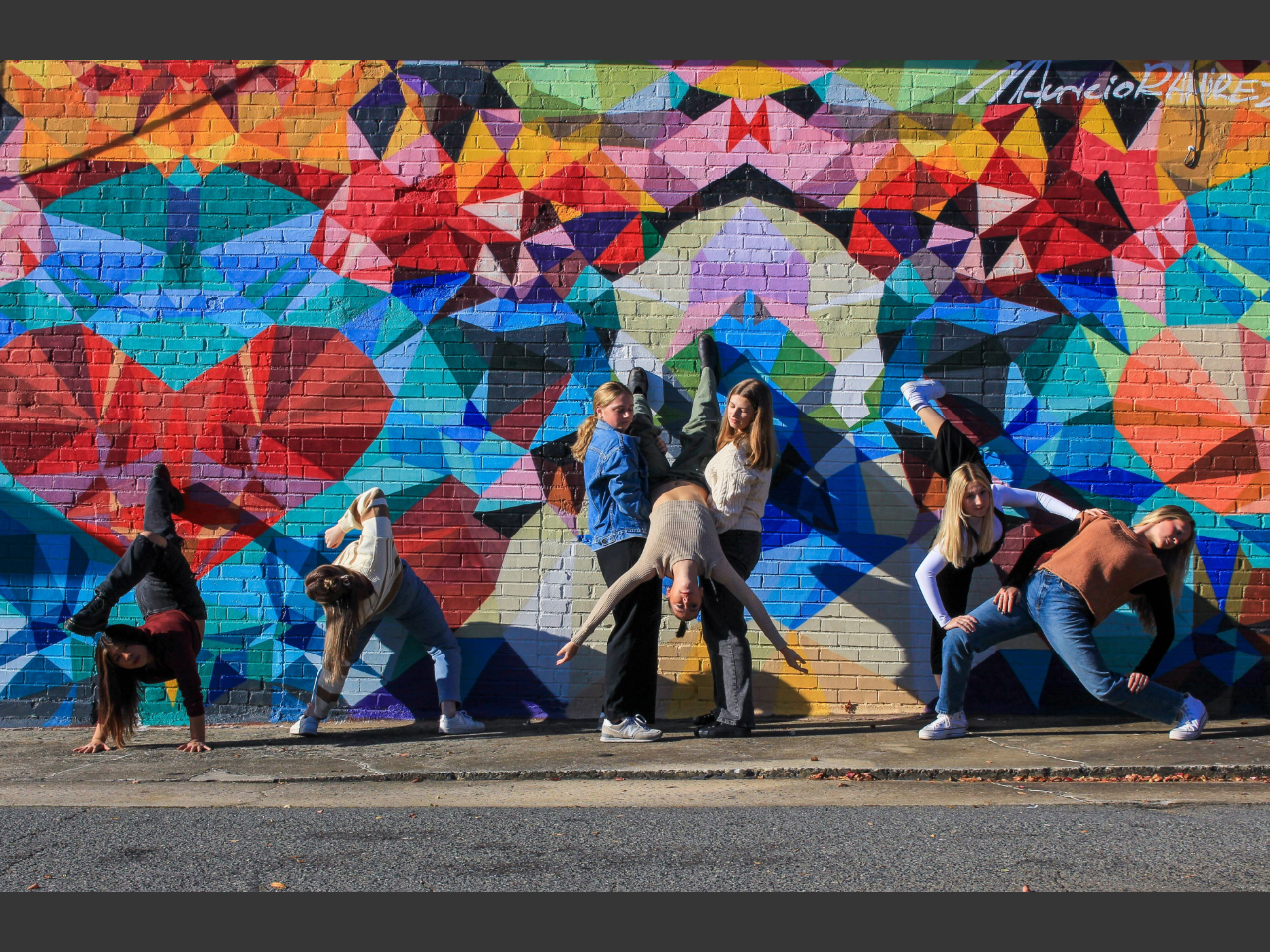The Rhoades Grant Dance Concert is Friday and Saturday in Roberts Studio Theatre, supported by a gift by retired Professor of Art Barbara Rhoades to fund students’ creative endeavors to enhance expression and education at Elon.
Built around bold themes that transcend the stage, the final concerts in a series of dance majors’ original works will premiere this weekend, thanks to a gift from a retired Elon professor.
“The Matriarchy: Stories of Womankind,” by Madeline Trigilio ’24, and “Movement Unscripted,” by Jessica Werfel ’24 will premiere at the Rhoades Grant Dance Concert at 7:30 p.m. Friday, March 15, and 2 p.m. and 7:30 p.m. Saturday, March 16, in Roberts Studio Theatre. The Saturday matinee will conclude with an audience Q&A.
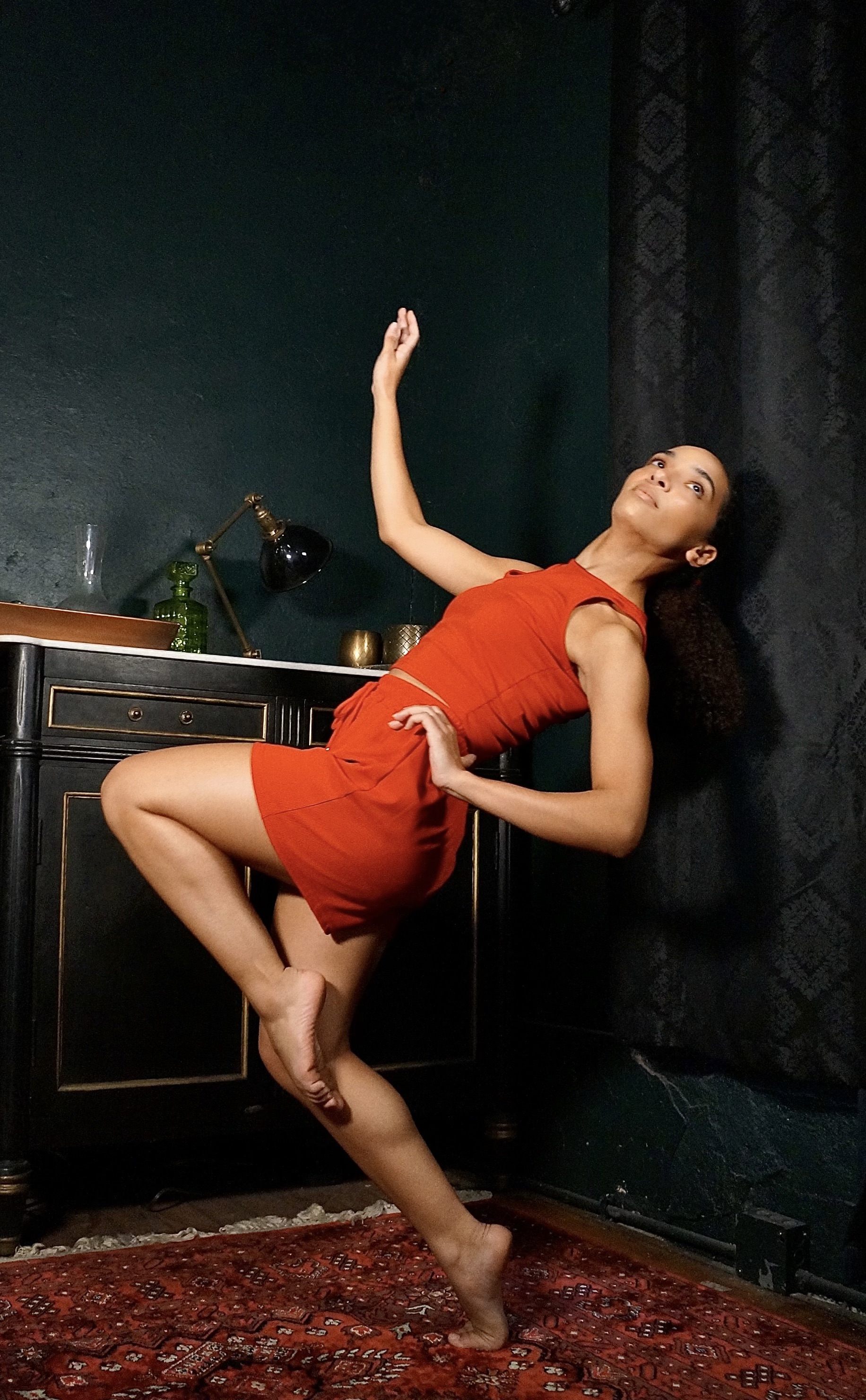
Trigilio’s “The Matriarchy: Stories of Womankind” explores female stereotypes and patriarchal norms in children’s media. Werfel’s “Movement Unscripted” is an investigation of improvised movement as a therapeutic approach to well-being. Their concerts follow Pheriby Bryan’s “Semicolon,” which premiered in October and confronted the effects depression and suicide have on individuals, families and communities through dance and post-show panel discussions.
All three concerts were developed by students over multiple academic years and funded by the Rhoades Grant, given by retired Professor of Art Barbara Rhoades to support and celebrate Elon students’ creative vision and expression. The 2022 gift provided up to $5,000 for dance majors to produce original works, involve other campus programs and participate in undergraduate research and global study.

“I found a deep personal connection to dance improvisation during the pandemic,” said Werfel, an arts administration and dance and choreography double major from South Riding, Virginia, who was mentored by Associate Professor of Dance Renay Aumiller. “This project has allowed me to share movement improvisation as a form of healing, care and community with my cast and soon, audiences.”
Trigilio, from Georgetown, Massachusetts, also double majoring in arts administration and dance and choreography, drew inspiration for “The Matriarchy: Stories of Womankind” from discussions with her mother about negative female stereotypes in media.
“Everything from the way cartoon women were drawn, to their masculine-dependent plotlines, was troubling to think about,” Trigilio said. “The process of putting on an entire show has been the perfect combination of my majors, and directing a show from the artistic and administrative side has been a hugely rewarding learning experience.”
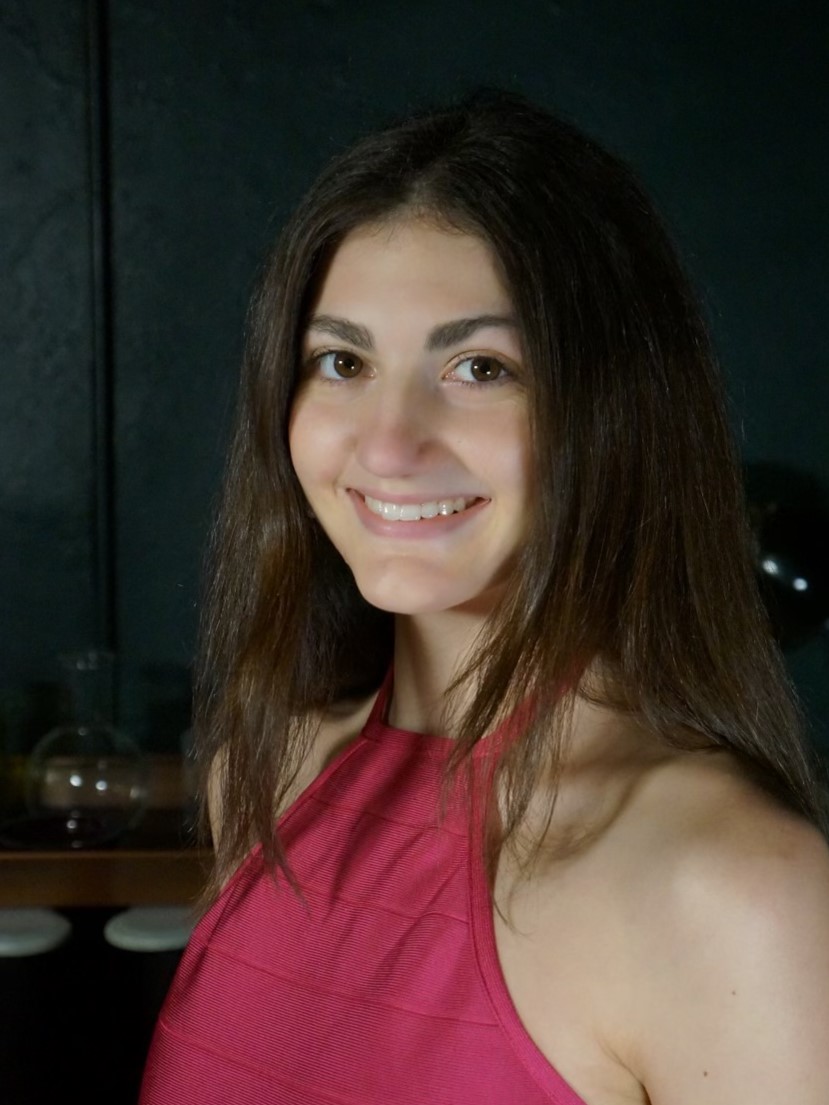
The Rhoades Grant gave dance majors the opportunity to stage ambitious projects on a scale that matches their creative vision, said Associate Professor of Dance Jen Guy Metcalf, who coordinated the grant and co-mentored Bryan’s “Semicolon” project.
“This gift from Barbara Rhoades made a profound impact on Pheriby, Jessica and Madi, who were enabled to complete meaningful research and inspired to collaborate with other students, campus organizations and communities because of it,” Metcalf said. “They each plan to continue their research and creative work after their concert and presentations, continuing Barbara Rhoades’ legacy.”
That’s especially true of Bryan, who is co-founding a new campus organization and will continue to spread awareness around suicide prevention into her senior year.
Message, mission of ‘Semicolon’ continue
“Depression and suicidal ideation are human struggles and need to be discussed to start the healing process. Putting these struggles on stage reminds us that the more people feel seen and heard, the more lives are saved,” said Bryan, who is a double major in dance and choreography and music in liberal arts from Charlotte, North Carolina.
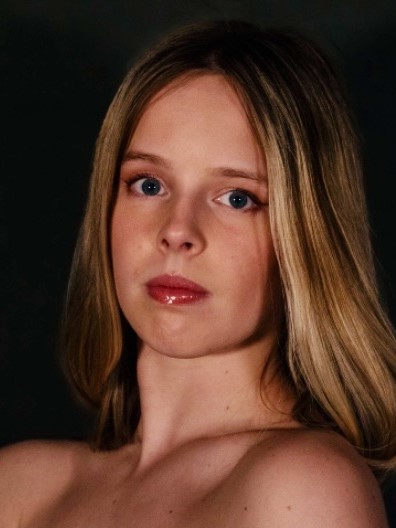
Bryan didn’t initially intend to apply for the Rhoades Grant but was inspired to create “Semicolon” by loss in her home community, among classmates and concern for her peers’ well-being. The catalyst was finding former high school classmate William Burleson’s blog, “semi-colon,” about his struggles with suicidal ideation and recovery.
“I was so moved by his bravery. I knew his writing was meant to be onstage, and I imagined what it could do for other college students,” Bryan said.
Co-mentored by Metcalf and Assistant Professor of Dance Keshia Wall, Bryan’s vision for “Semicolon” quickly grew larger than a performance. Metcalf guided Bryan to research choreography exploring weighty subects and encouraged her to consult with Meredith Harrison, a counselor/group coordinator with Elon’s Counseling Services, to better understand mental health topics. Wall helped to refine choreography and led Bryan through the intricacies of staging a complex show — from technical details to how to support the cast and crew.
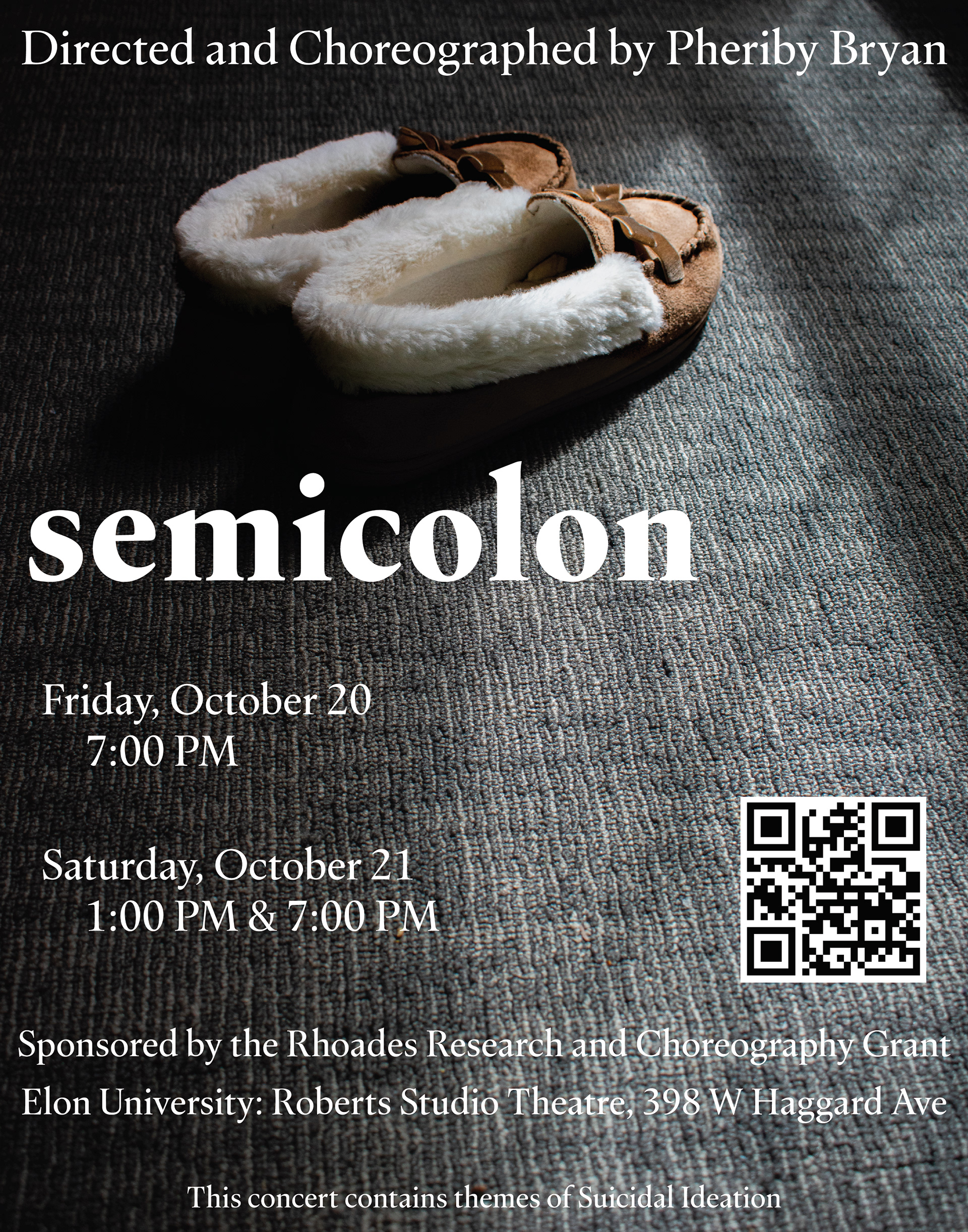
The finished concert consisted of four choreographed dances about mental health and the reverberating effects of suicide in families and communities. Each show concluded with a panel of speakers that included staff from Elon’s Counseling Services and Truitt Center for Spiritual Life, Burleson, Heather Bonner — the mother of Bryan’s high school classmate who lost a son to suicide — and mental health advocates. More than 100 students, including Elon’s Camerata vocal ensemble, contributed to the production.
“Dance is a modality for social change and wellness that, at the end of the day, is about storytelling,” Wall said. “The beautiful thing Pheriby did was to look beyond one person and see how many others are impacted by these issues and tell their stories, too. Watching audience members receive and connect with those stories as the concert was happening was beautiful. I saw people sobbing. People responded to the music, the dancers, the issue itself and the loss in our communities.”
In fall 2024, Bryan plans to present her work around “Semicolon” at conferences and co-found a campus chapter of Mission 34, a suicide prevention organization Bonner established after her son’s death.
“Elon encourages collaboration, and I wouldn’t have been able to complete this project to this degree or with the number of people involved if I were at another school,” Bryan said. “The Rhoades Grant gave me the support I needed to create my vision, complete three semesters of research and bring it to a stage. Without it, creating a work like this would not have been possible.”



